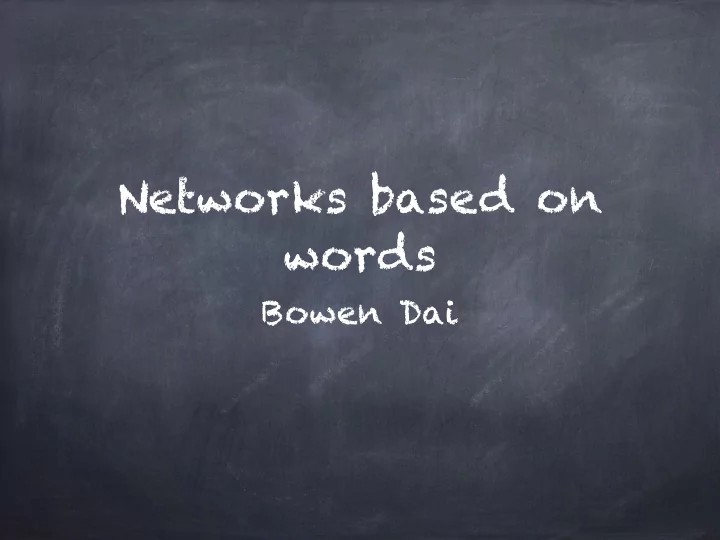

Networks based on words Bowen Dai
WANs definition • Word-adjacency networks belong to the large class of word co-occurrence networks • Given a set of words W and a list of k corpora C={c 1 ,c 2 …c k }, the undirected co- occurrence network is defined as G={W,E(W,C)} where {w 1 , w 2 } ∈ E(W,C) if w i and w j co-occur in at least on corpus.
The small word of human language The so called small-world effect. In particular, the average distance between two words, d (i.e. the average minimum number of links to be crossed from an arbitrary word to another), is shown to be d º 2^3, even though the human brain can store many thousands
The small word of human language A scale-free distribution of degrees A scale-free network is a network whose degree distribution follows a power law, at least asymptotically.
The small word of human language lexicon kernel co-occurrence of words in sentences relies on the network structure of the lexicon
The small word of human language For random graphs, For SW graphs, d is close to that expected for random graphs, with the same k and These two conditions are taken as the standard de¢nition of SW
The small word of human language
Triad significance profile The TSP shows the normalized significance level (Z score) for each of the 13 triads
Application of WANs
Authorship Attribution Encode structures as word adjacency networks (WANs) which are asymmetric networks that store information of co-appearance of two function words in the same sentence With proper normalization, edges of these networks describe the likelihood that a particular function word is encountered in the text given that we encountered another one. In turn, this implies that WANs can be reinterpreted as Markov chains describing transition probabilities between function words.
Northanger Abby Emma Sense and Sensibility Pride and Prejudice The Adventures of Tom Sawyer Eve’ s A Connecticut Yankee in Diary King Arthur’ s Court The Innocents Abroad Bartleby, the Scrivener Redburn Typee Omoo
Authorship Attribution For a given sentence, we define a directed proximity between two words parametric on a discount factor α ∈ (0, 1) and a window length D. If we denote as i( ω ) the position of word ω within its sentence the directed proximity d( ω 1, ω 2) from word ω 1 to word ω 2 when 0 < i( ω 2) − i( ω 1) ≤ D is defined as
Authorship Attribution both w1 and w2 are function words
Authorship Attribution parameter α = 0.8, the window D = 4 a swarm in May is worth a load of hay; a swarm in June is worth a silver spoon; but a swarm in July is not worth a fly a swarm in May is worth a load of hay a swarm in June is worth a silver spoon but a swarm in July is not worth a fly
Authorship Attribution Function WANs function words as nodes The weight of a given edge represents the likelihood of finding the words connected by this edge close to each other in the text from a given text t we construct the network Wt = (F , Qt) where F = {f1, f2, ..., ff } is the set of nodes composed by a collection of function words common to all WANs being compared and Qt : F × F → R+ is a similarity measure between pairs of nodes.
Authorship Attribution s(e) is the word in the e-th position within sentence h of text t
Authorship Attribution sum all matrix for the same author and then create the markov chain
Authorship Attribution The normalized networks P can be interpreted as discrete time Markov chains (MC) Since every MC has the same state space F , we use the relative entropy H(P1, P2) as a dissimilarity measure between the chains P1 and P2. The relative entropy is given by
Authorship Attribution
Future Topic What’ s next after we find a network satisfied SW Markov chain dai.171@osu.edu
bibliography Segarra, S., Eisen, M., & Ribeiro, A. (2015). Authorship attribution through function word adjacency networks. Signal Processing, IEEE Transactions on, 63(20), 5464-5478. Ferrer, I. C. R., & Solé, R. V . (2001, November). The small world of human language. In Proceedings. Biological sciences/The Royal Society (Vol. 268, No. 1482, pp. 2261-2265). Zweig, K. A. (2016). Are Word-Adjacency Networks Networks?. In Towards a Theoretical Framework for Analyzing Complex Linguistic Networks (pp. 153-163). Springer Berlin Heidelberg.
bibliography Milo, R., Itzkovitz, S., Kashtan, N., Levitt, R., Shen-Orr, S., Ayzenshtat, I., ... & Alon, U. (2004). Superfamilies of evolved and designed networks. Science, 303(5663), 1538-1542. Choudhury, M., Chatterjee, D., & Mukherjee, A. (2010, August). Global topology of word co-occurrence networks: Beyond the two-regime power-law. In Proceedings of the 23rd International Conference on Computational Linguistics: Posters (pp. 162-170). Association for Computational Linguistics. Choudhury, M., & Mukherjee, A. (2009). The structure and dynamics of linguistic networks. In Dynamics on and of Complex Networks (pp. 145-166). Birkhäuser Boston.
Recommend
More recommend